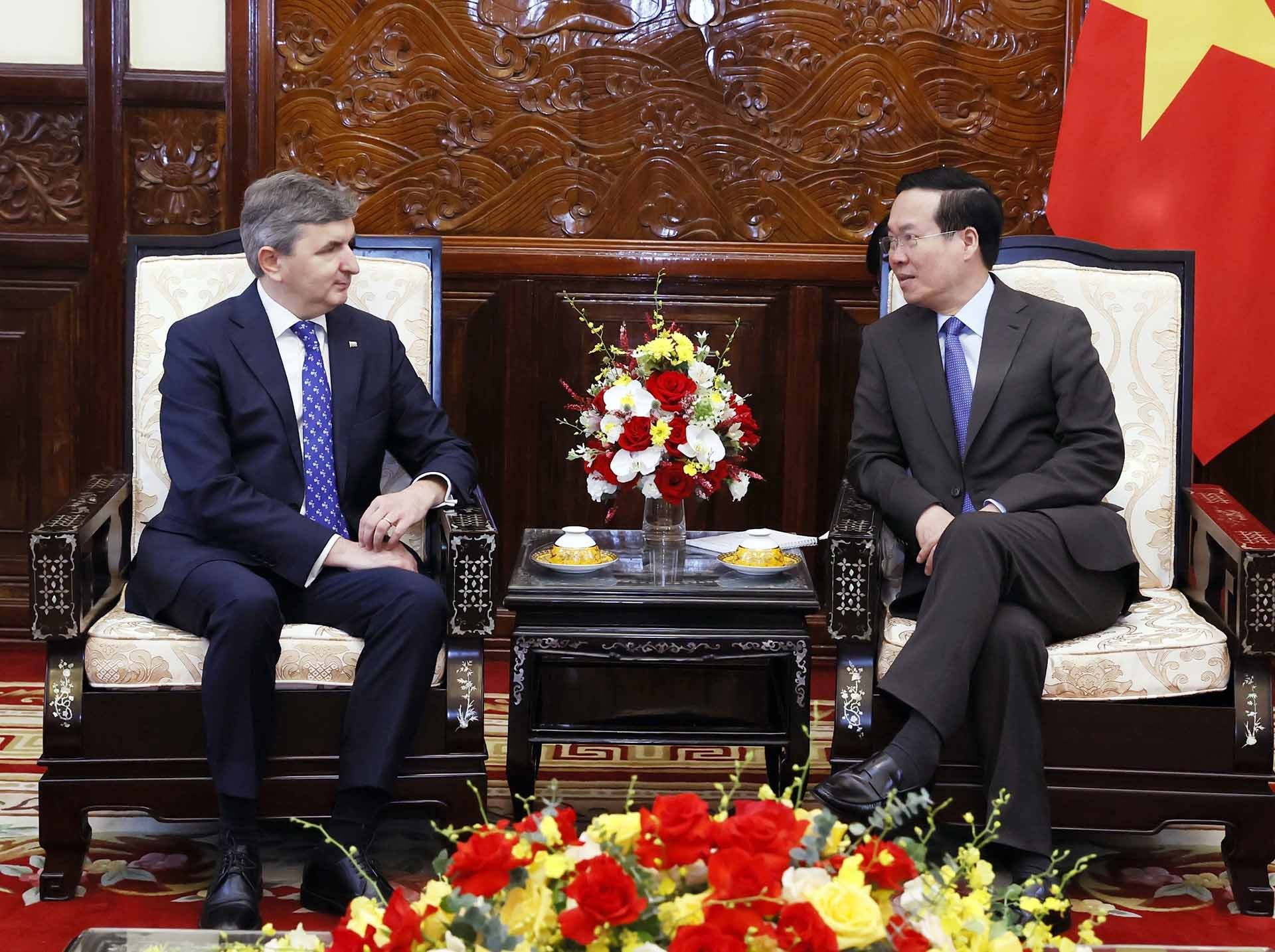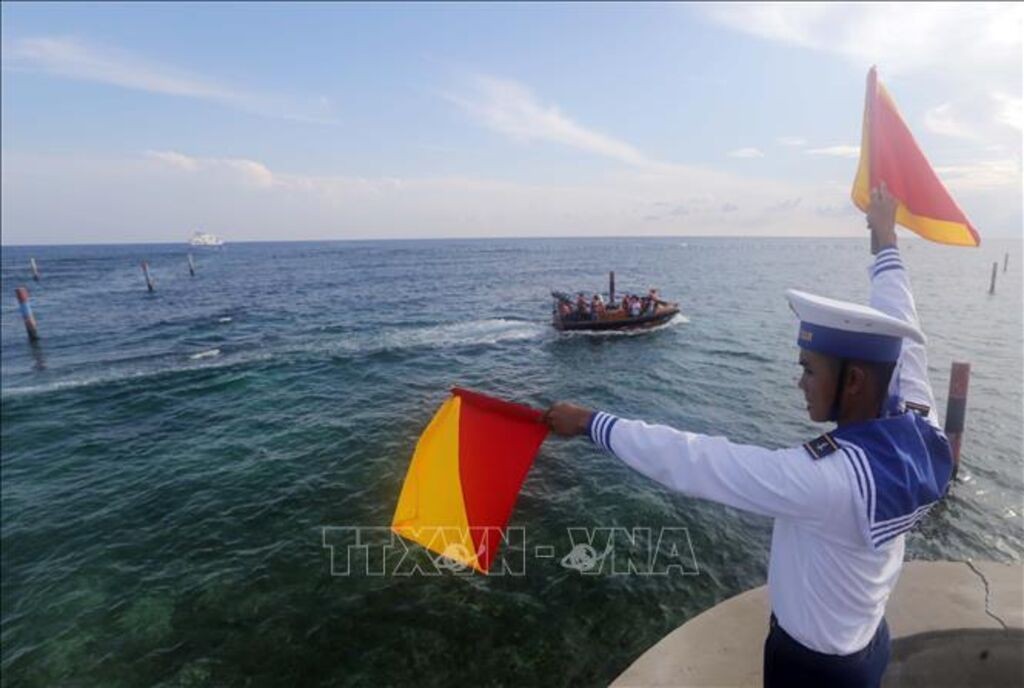
Vietnam is an important partner in strengthening rules-based order: Lithuanian Ambassador
Latest
 |
| President Vo Van Thuong received Lithuanian Ambassador Darius Gaidys. (Photo: VNA) |
Could you please share us about the significances and main focuses of the Lithuanian Foreign Minister Gabrielius Landsbergis’s official visit to Vietnam?
The timing of the visit to Vietnam of our Foreign Minister clearly shows its’ importance. Without any doubt, Euro-Atlantic and Indo-Pacific areas are both on the geopolitical frontline with closely intertwined security and escalation in one region will have direct effects on the other`s security.
We see Vietnam as an important partner in strengthening the rules-based order regionally as well as internationally by jointly participating in various initiatives in the international formats, including United Nations.
This is the key for both sides and could be achieved by engaging in more active political dialogue and bilateral economic cooperation. In this regard, we are pleased to sign the updated Memorandum Understanding between the Ministries of Foreign Affairs of Lithuania and Vietnam on bilateral consultations, as well as the new Memorandum of Understanding with the Diplomatic Academy of Vietnam (DAV).
Regional engagement also plays a huge role – the Minister will also participate in OECD Southeast Asia Regional Program Ministerial Forum.
Recently, you have commented that the Lithuanian Government is implementing a new development strategy, favorable for strengthening relations with Vietnam. Could you share more detail about that?
Lithuania's Strategy for the Indo-Pacific was adopted this July. It defines a key priority of Lithuania's foreign policy - to strengthen the representation of Lithuania's interests in the region. The strategy is structured in 3 pillars – security policy, economic policy, soft power and networking – all of which are interrelated.
The strategy commits to support the democratic, good governance and rule of law dimensions of regional formats, in particular ASEAN, and to develop partnerships with the fast-growing Indo-Pacific economies in the fields of technology and biotechnology, information and communication technologies.
| "Concerning South China Sea, Lithuania and Vietnam adhere to the same principles regarding freedom of navigation and overflight, and we fully support ASEAN's efforts to agree on a Code of Conduct with China". |
The security pillar focuses on developing regional capabilities, sharing and adopting expertise in the areas of defence cooperation, resilience building, cybersecurity, fight against hybrid threats and others. The economic pillar focuses on ensuring mutually beneficial partnerships and promotion of strategic diversification.
The final, soft power pillar focuses not only areas such as human rights, tourism, cultural or scientific cooperation, but also discusses the expansion of diplomatic representation in the region. Lithuania has recently opened Embassies in Australia, Republic of Korea, Singapore, and further expansion of diplomatic missions is under consideration.
What are your assessments of the prospects for economy cooperations between the two nations in the coming time?
It is great to see that trade relations between Lithuania and Vietnam are getting more active – last year our bilateral trade flow increased by 20 percent.
But there is, undoubtedly, much more potential. We are looking to promote cooperation with Vietnam in high-tech industries such as life sciences, information and communication technologies, renewable energy, space technology, engineering, as well as in more traditional industry sectors – food industry, textiles or chemicals.
With recent approval of Vietnam’s Master Energy Plan, I would see potential for cooperation in energy sector. Development of the renewable (hydro, wind, biomass and solar) energy sector in Lithuania has been rapidly accelerating. Among companies doing business in Asia, we have a solar panels producers that have already installed solar power plants in Indonesia and Malaysia - they would also be ready to participate in solar power plant projects in Vietnam as well.
 |
| A soldier performing his duties as a navigator, helping a canoe travelling to Da Lat island, Truong Sa archipelago. (Source: VNA) |
LNG is the other energy area with great cooperation prospects. We know that Vietnam has intentions to develop more than 10 new LNG projects. Klaipėdos Nafta, operator of Lithuanian LNG terminal, has participated in implementation or operation of 7 FSRU (floating storage and regasification units) terminals worldwide.
Being an experienced global player, the company could support Vietnamese partners in development and operation of FSRU projects. Klaipėdos Nafta is a state-controlled company of strategic importance ensuring natural gas supply security in Lithuania since 2014 and can share such experience. We invite Vietnamese companies to visit Lithuania and our operational LNG terminal to learn the advantages and particularities that are important in these types of projects.
Our companies are also interested to purchase raw materials from Vietnam, for example, by importing various materials for production of pharmaceuticals and food supplements, or steel for manufacturing and construction sectors.
How do you evaluate Vietnam's role in ASEAN? How can Vietnam help Lithuania in cooperation with ASEAN?
We understand that membership has benefited both Vietnam and the ASEAN itself in terms of regional integration.
We could also emphasize Vietnam's positive role in strengthening cooperation in supply chain diversification, green services and technologies. Concerning South China Sea, Lithuania and Vietnam adhere to the same principles regarding freedom of navigation and overflight, and we fully support ASEAN's efforts to agree on a Code of Conduct with China.
We strongly support the cooperation between Vietnam and the EU and celebrate the Just Energy Transition Partnership concluded between Vietnam and the EU. Vietnam became the third country with which such a program was concluded after South Africa and Indonesia. We believe that there will be a niche here in the future for our businesses to participate and cooperate in the process of Vietnam's energy transition to net zero by 2050 goals.









